NHRC, India celebrates Human Rights Day
NATIONAL HUMAN RIGHTS COMMISSION
New Delhi, 10th December, 2023
NHRC, India celebrates Human Rights Day
Vice President of India, Shri Jagdeep Dhankhar describes India as a global role model for nurturing human rights
Expresses concern over the prejudiced crony criticism of the country by some global entities despite remarkable growth on all fronts and improvement in quality of life
NHRC Chairperson, Justice Shri Arun Mishra says, both governmental and individual responsibilities are integral to creating a just and equitable society where human rights are valued, protected, and upheld for everyone
Says, condoning or sympathising with terror activities and terrorists is a great disservice to the cause of human rights
The National Human Rights Commission, NHRC, India today organized a function at Bharat Mandapam in New Delhi to celebrate Human Rights Day in commemoration of the Universal Declaration of Human Rights (UDHR). Addressing the gathering as the Chief Guest, the Vice President of India, Shri Jagdeep Dhankhar reflected on India's position as a role model to the world for nurturing human rights for the one-sixth of the global population. Underlining the respect for human rights that is embedded in the nation's civilizational ethos and Constitution, the Vice-President emphasised that human rights form the very cornerstone of the democracy.
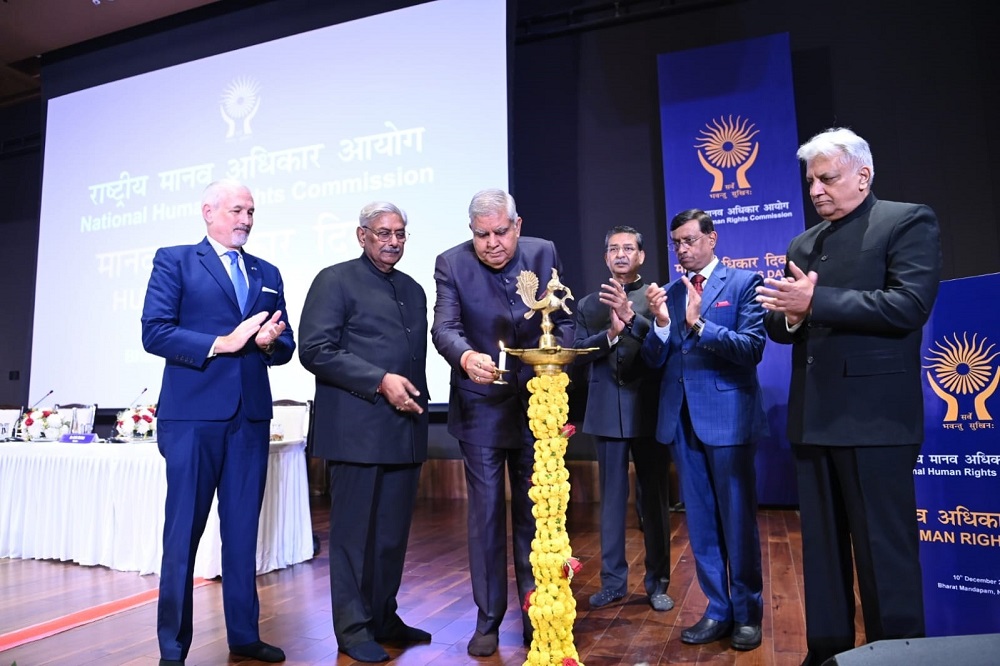
He said that India has been treated unfairly by some global entities and asked them to delve deep into the nation's performance on various aspects of human rights and not merely scratch the surface. He wanted such entities including the crony critics setting pernicious and subjective narratives to take note of “India's governance model that is free from corruption, favouritism and nepotism. He said that it is dictated by transparency, accountability and merit.”
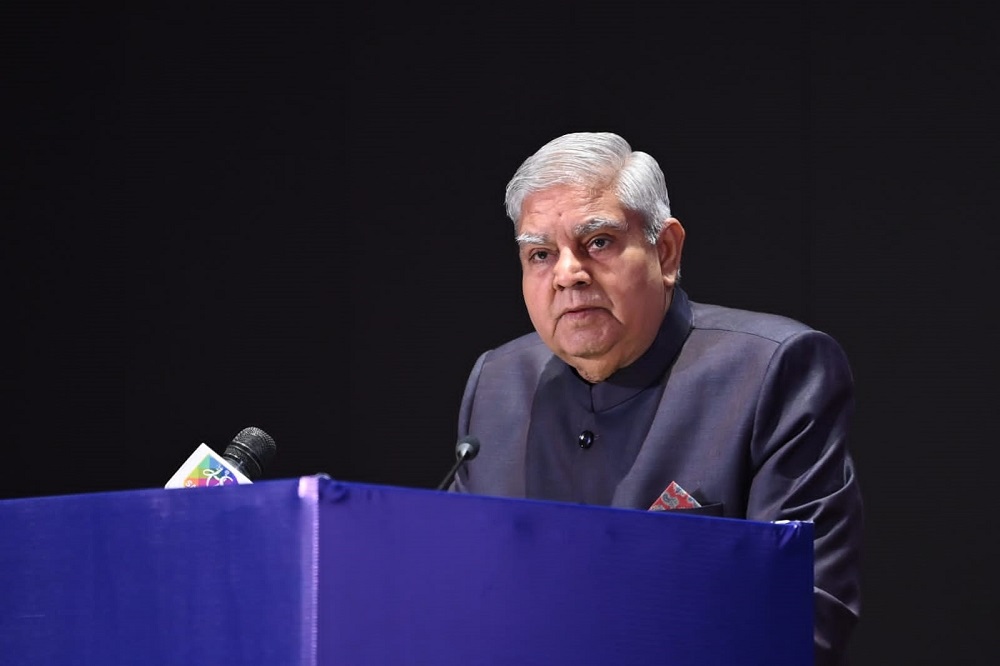
Shri Dhankhar expected them to look at India's rise reflected on land and sea, in sky and space. India stands for the common good of the common man. India has emerged as a global leader and agenda-setter. This is a day to open their eyes, and see how the one-sixth of the humanity in Bharat is influencing the world at large, and talking about peace, harmony, and growth. He said that India is not seeking from the outside world congratulations for becoming the voice of the Global South. We are just urging them not to be prejudicially subjective by clinging to their predetermined thoughts.
The Vice-President emphasized that the government's affirmative implementation of inclusive policies has liberated millions from poverty's grasp. This achievement paved the way for a future enriched with “economic opportunities, access to quality healthcare, and a sound education - the pillars upon which a robust human rights edifice rests”. He said that providing gas connections, toilets, drinking water, and free ration to more than 80 crore people is a “transformative revolution”, which gave reprieve from toiling tears in the eyes of our mothers and sisters. He said that the National Education Policy and the massive infrastructural growth as quintessential for “proliferation and empowerment of human rights”.
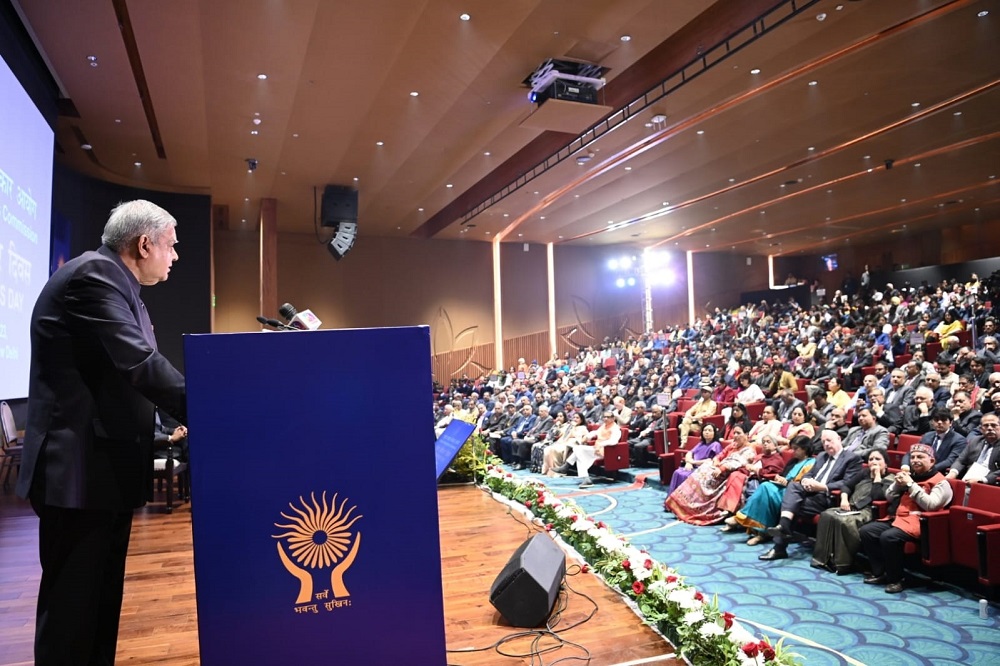
Talking about the recent upsurge in the politics of freebies, the Vice-President cautioned that this will lead to distortion of expenditure priority and shall undermine the basic framework of macroeconomic stability. He said that he would appreciate the NHRC to catalyze a healthy national debate on the politics of freebies and coming out with a paper that can be extremely informative, motivational and inspirational for the people at large and those who are in seats of governance can be enlightened that we have to empower human minds and not pockets.
The Vice President commended the NHRC, India Chairperson Justice Arun Mishra for his concerns towards human rights. He said that his call for removing the stigma attached to mental illness has been impactful and widely appreciated, as it is reflecting on something which is a global challenge. He said that the NHRC Chairperson has keenly engaged all through in sensitizing society to treat HRDs as their eyes and ears for human rights. He firmly spoke for HRDs and became their defender to evolve a system, which becomes friendly for nurturing human rights. He said that the NHRC deserves to be complimented for encapsulating the essence of human rights in its report on post-poll violence in West Bengal, thereby promoting the principles of the Rule of Law.
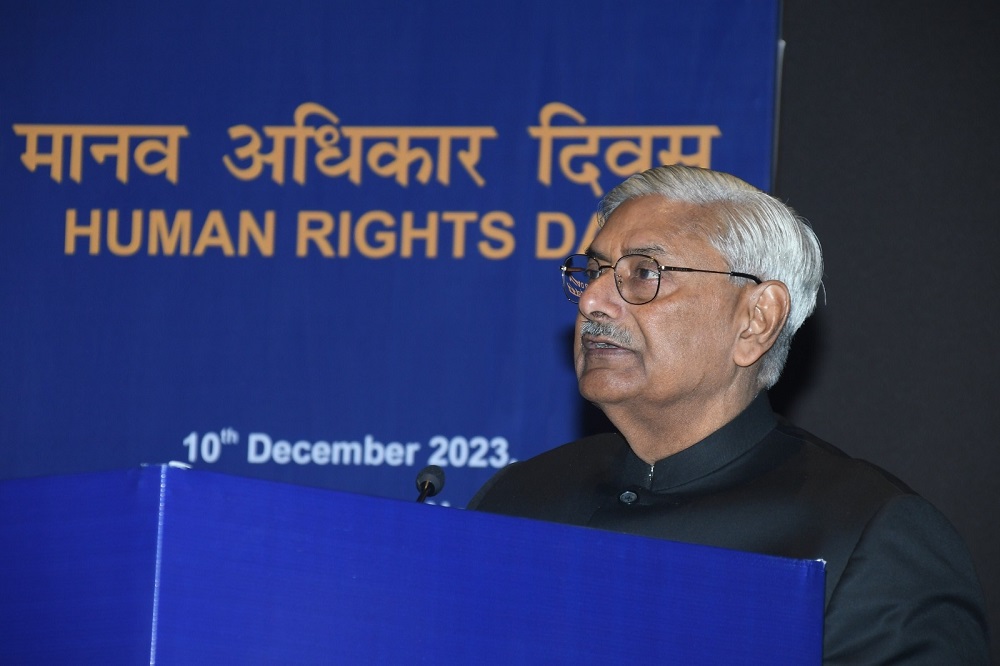
Earlier, addressing the gathering, NHRC, India Chairperson, Justice Shri Arun Mishra expressed the hope that in an age marked by rapid technological advances, globalisation, and an increasingly interwoven socio-cultural fabric, the shared commitment towards human rights may propel the world towards a tomorrow where the inherent dignity and rights of every person are acknowledged and protected by all. Dramatic rises in inequality and the triple planetary crisis, climate change, biodiversity loss, and pollution require immediate attention. At the same time, businesses must effectively address human rights concerns.
He said that business enterprises are a major source of investment, innovation, and development. New digital technologies have transformed the way people live. These can be a significant driver in achieving progress for all and the Sustainable Development Goals (SDGs). However, the ethical ramifications of advancing technologies are a matter of grave concern. The internet is useful but also has a dark side, infringing on privacy through the spread of hate speech misinformation, undermining democratic processes, and increasing online violence against women and children. When improperly or maliciously used, it can fuel divisions within and between communities to undermine human rights.
Justice Mishra said that terrorism causes grave violations of human rights. Condoning or sympathising with terror activities and terrorists is a great disservice to the cause of human rights. We must not glorify or sympathise with them.
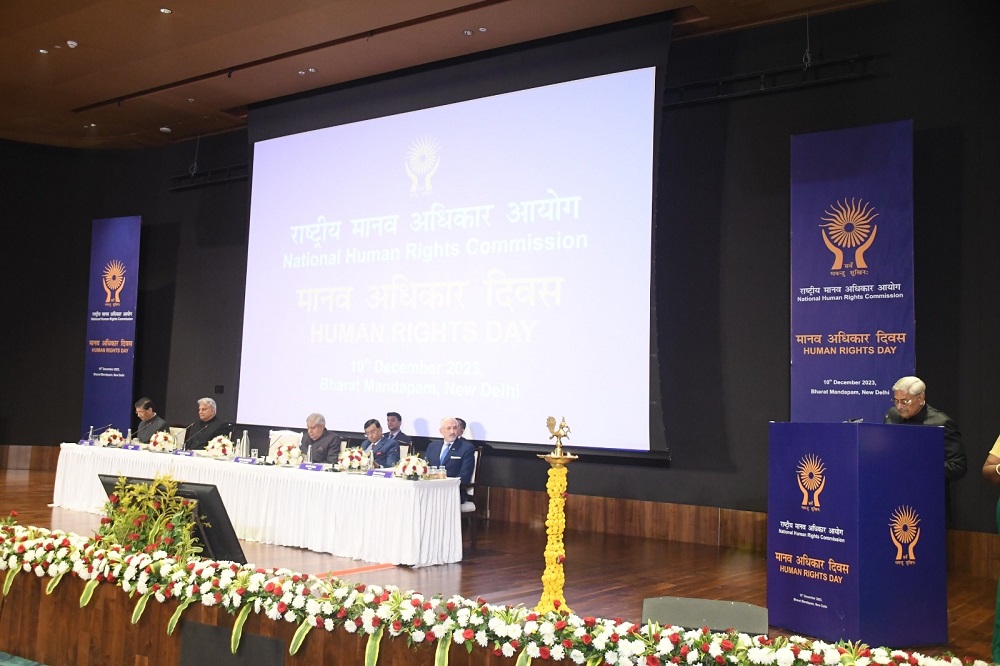
Lauding the role of the institutions of local self-governance, the Municipal bodies and Panchayats, Justice Mishra said that these institutions are indispensable in implementing constitutional values “Swaraj” on the ground. They must effectively and transparently discharge their statutory civic functions enjoined upon them in advancing human rights and promoting the concept of 'fraternity,' by improving the quality of life ensuring clean water supply, water, sanitation, and public health, and ensuring equality for citizens.
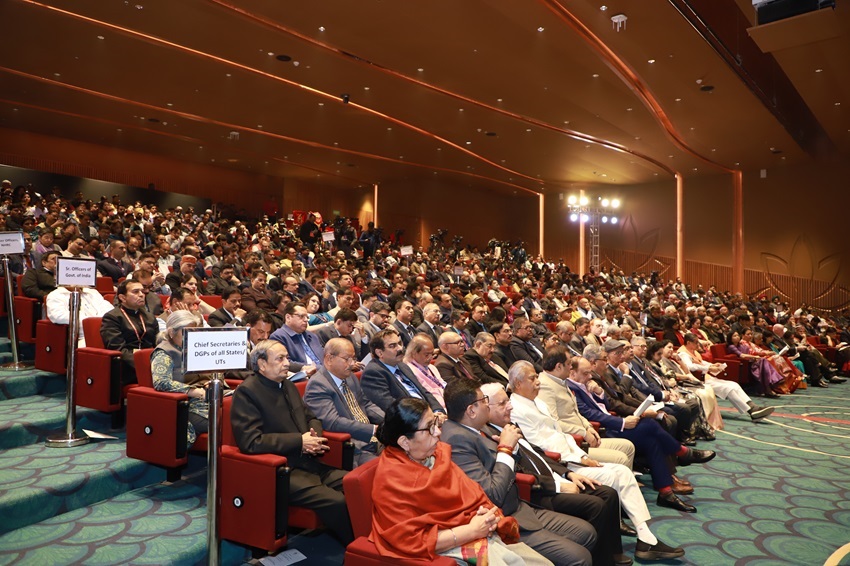
He said that both governmental and individual responsibilities are integral to creating a just and equitable society where human rights are valued, protected, and upheld for every individual. He flagged five burning issues, which, he said, have huge ramifications on human rights on a vast scale. These are poverty, climate change, harmonizing human rights and business, women empowerment in the workplaces, providing safe and secure cyberspace and strengthening vulnerable groups including transgender, persons with mental illnesses, sex workers, beggars, destitute, elderly, orphaned children, and persons in need. Their human rights violations must be addressed on priority, with sensitivity to their plight. Besides this, he said that the problems of spurious drugs, medicines, food adulteration, and drug addiction, among the young generation must be dealt with stringently and expeditiously.
On the occasion, the United Nations Secretary-General, Mr António Guterres in his message, read out by Mr. Shombi Sharp, UN Resident Coordinator in India, said that the iconic opening sentence of the Universal Declaration of Human Rights is as important today as it was when it was adopted 75 years ago that “All human beings are born free and equal in dignity and rights.” He called upon the member states to use this 75th Anniversary, and the summit of the future next year, to strengthen their commitments to the timeless values of this Declaration which is a roadmap, helping to end wars, heal divisions and promote lives of peace and dignity for all.
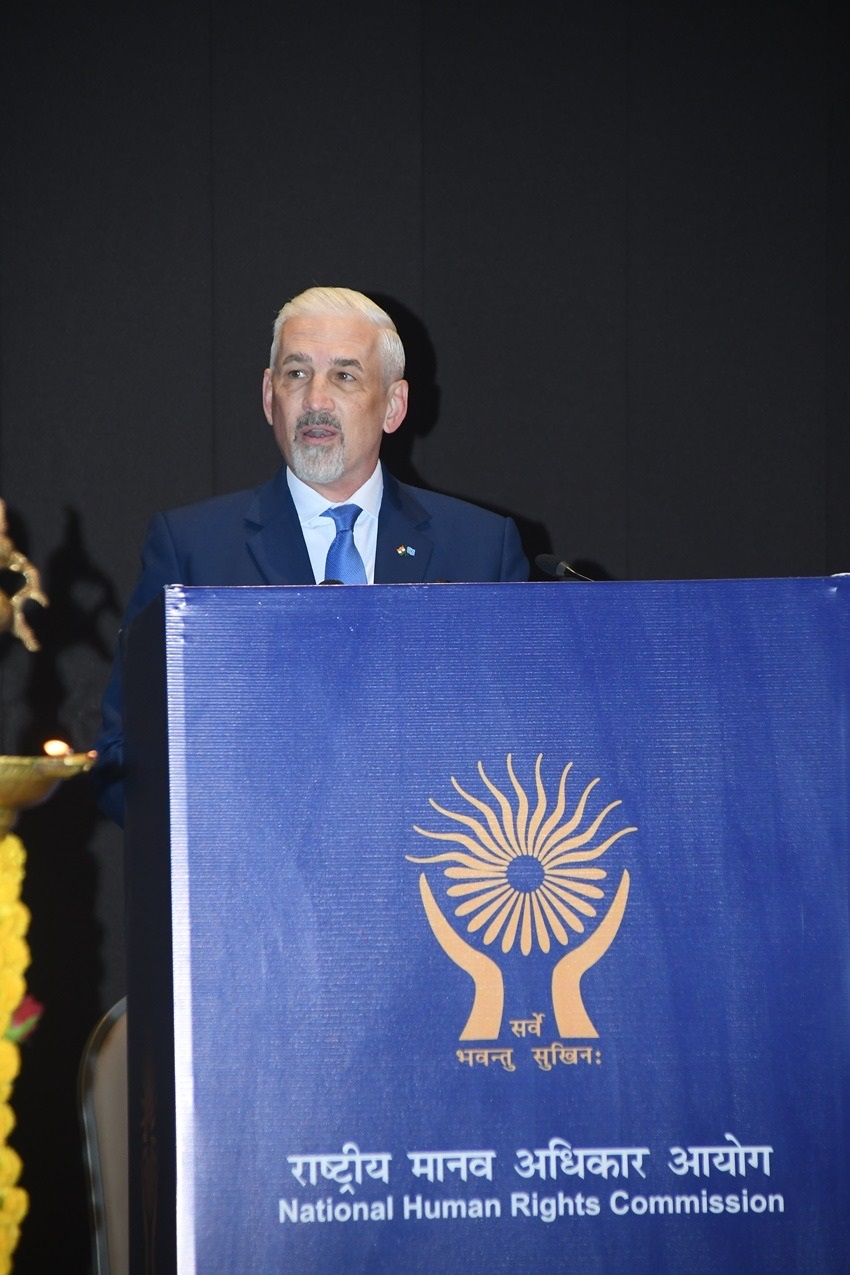
Before this, the NHRC, Secretary General, Shri Bharat Lal said that observing Human Rights Day in commemoration of the UDHR reminds us that empathy and compassion are a way of life. He highlighted the critical role the Commission has been playing since its inception towards the promotion and protection of human rights by proactively resolving cases of rights violations besides issuing several guidelines and advisories to ameliorate the cause of human rights. He said the NHRC, in the last 30 years of its existence has dealt with more than 22 lakh cases and recommended over Rs. 230 crore as relief to the victims.
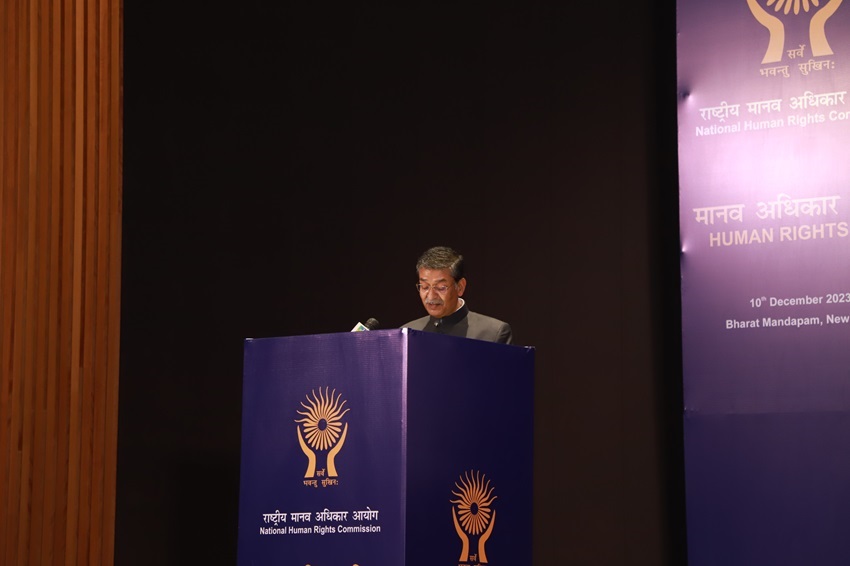
On the occasion, three NHRC publications were also issued. These included Hindi and English Journals carrying scholarly articles on human rights issues by the experts, and a book titled Forensic Science and Human Rights.
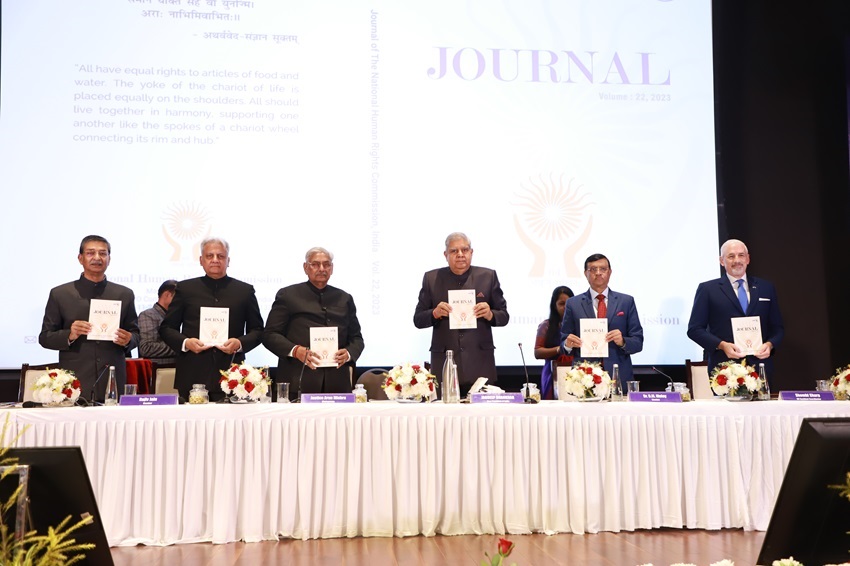
NHRC Members, Dr Dnyaneshwar Manohar Mulay and Shri Rajiv Jain, Members of the Judiciary, the Statutory Commissions, State Human Rights Commissions, Diplomats, Special Rapporteurs, Special Monitors, academicians and members of the civil society, NGOs, human rights defenders, students, specially-abled children, among others, were present.







 राष्ट्रीय मानव अधिकार आयोग, भारत
राष्ट्रीय मानव अधिकार आयोग, भारत

